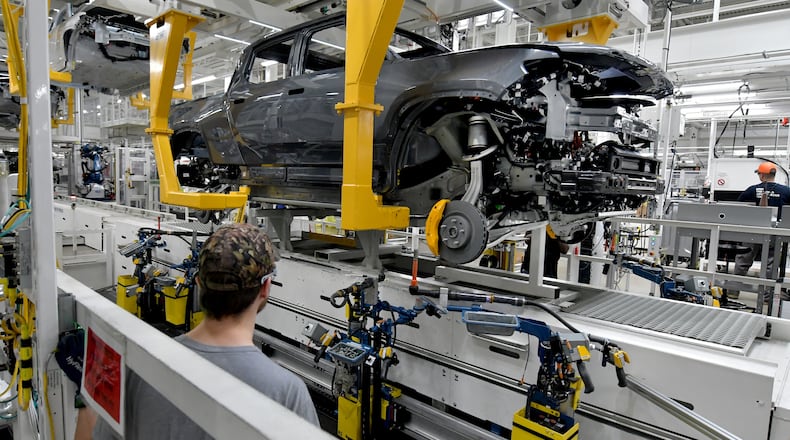The CEO of electric vehicle maker Rivian said Thursday the company will meet its goal of building 25,000 automobiles this year, but the company also expects its losses to widen as the startup contends with higher costs, supply chain issues and other headwinds.
Rivian reported a net loss of $1.7 billion in the quarter that ended in June, triple its reported losses from the same period a year ago before the company went public and started to ramp up production of its electric R1T truck, R1S SUV and delivery vans for Amazon.
Rivian said it remains on track to start production at its future $5 billion Georgia factory by 2024 and has sufficient cash on hand to accomplish that goal. But the company remains under pressure to produce more vehicles and boost revenue to stem its losses.
The EV company has to increase production at an aggressive pace to meet its 25,000 goal.
“While we continue to manage supply chain constraints, we are encouraged by the progress we’re making,” Rivian CEO R.J. Scaringe said. He said the company will soon open a second assembly shift at its first factory in Illinois.
Rivian reported $364 million in revenue during the second quarter, nearly four times what it produced in the first three months of this year. Rivian also produced 4,401 vehicles in the April to June period, up 72% from first quarter.
Scaringe said ramping up production hinges on the company’s plans to begin a second shift during the third quarter at Rivian’s Illinois factory.
Hiring has started, but supply chain issues have to be resolved before production growth can start, he said.
“It wouldn’t make any sense for us to have to hire a whole second shift and then have the line sit still waiting for parts,” he said.
The California-based company entered 2022 with a production goal of 50,000 vehicles, but that was cut in half after a sluggish first quarter was hampered by issues obtaining computer chips and other vital components.
The Georgia factory is expected to manufacture a new vehicle model, the R2 crossover, starting in 2025. The vehicle will be sold at a lower price than the R1T and R1S, and they’re crucial to expanding Rivian’s customer base.
The company received a $1.5-billion incentive package from state and local authorities to come to Georgia, where the company has said it will employ 7,500.
Scaringe said customers remain interested in their R1T pickup trucks and R1S SUVs, as they amassed about 98,000 preorders during the second quarter. He was also optimistic about the likely passage of the Inflation Reduction Act, which includes several policies aimed to nudge more Americans to adopt EVs while also incentivizing automakers to increase production in North America.
The bill, which the U.S. House is expected to pass Friday along partisan lines, requires automakers to avoid using materials and components sourced from a “foreign entity of concern,” which includes China and Russia. It also requires new EVs to be sold for more moderate prices in order to qualify for $7,500 tax credits.
“This type of legislation creates a needed tailwind for both consumers and industry,” he said. But Scaringe also acknowledged that Rivian’s current vehicles are too expensive to meet the bill’s tax credit requirements.
That could put Rivian at a disadvantage.
Rivian said it still has about $15.5 billion in cash and cash equivalents on hand. The company said its operating loss for the full year is likely to be $5.45 billion, up $700 million from prior estimates.
To trim costs, Rivian is cutting 6% of its workforce, or about 900 employees.
A note of disclosure
Cox Enterprises, owner of The Atlanta Journal-Constitution, owns about a 4% stake in Rivian and supplies services to the company. Sandy Schwartz, a Cox executive who oversees the AJC, is on Rivian’s board of directors and holds stock personally. He does not take part in the AJC’s coverage of Rivian.
About the Author
Keep Reading
The Latest
Featured




